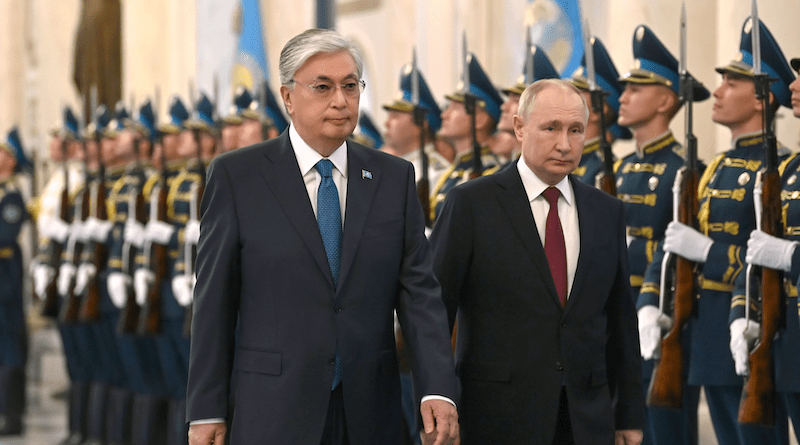Kazakhstan President Uses Language To Deliver Surprising Message To Russia
By Eurasianet
By Justin Burke
(Eurasianet) — Kazakhstan’s president, Kassym-Jomart Tokayev, hosted routine talks with Russian leader Vladimir Putin in Astana on November 9. At the customary, post-meeting press conference, Tokayev said little that was new, yet his delivery marked a notable departure from the past. He opened his remarks in Kazakh, not Russian.
Tokayev’s rhetoric included the usual platitudes concerning the strength of bilateral relations, which he said were underpinned by “unshakable values of mutual respect and trust.” He went on to “confirm Kazakhstan is committed to the strategic direction of further strengthening comprehensive cooperation with Russia.” But in making top Russian officials in attendance, including Foreign Minister Sergei Lavrov and presidential spokesman Dmitry Peskov, reach for their translation devices, Tokayev sent a clear signal to the Kremlin: the dynamics of the relationship are shifting as the Ukraine war plays out. Russia needs to actually respect Kazakhstan’s sovereignty, in deeds not just words, and adjust its imperial mindset.
Putin likely rankled his host by mispronouncing the Kazakh president’s name on several occasions in Astana, at one point calling him “Kemel Jomartovich.” It was not the first such flub for Putin, who previously has called Tokayev – whose patronymic is Kemeluly (or Russified, Kemelovich) – “Kemel Jomartovich,” as well as mangling the Kazakh president’s patronymic in a variety of other ways, Tokayev’s use of Kazakh may have been his way of offsetting Putin’s disses with a diss of his own.
Tokayev has walked a fine diplomatic line during the Ukraine war, striving to keep both the West and Russia satisfied. While repeatedly striving to reassure Russia that Kazakhstan is a good neighbor, he has told Western leaders, including German Chancellor Olaf Scholz, that Kazakhstan is committed to enforcing economic sanctions against Russia.
Justin Burke is Eurasianet’s publisher.

